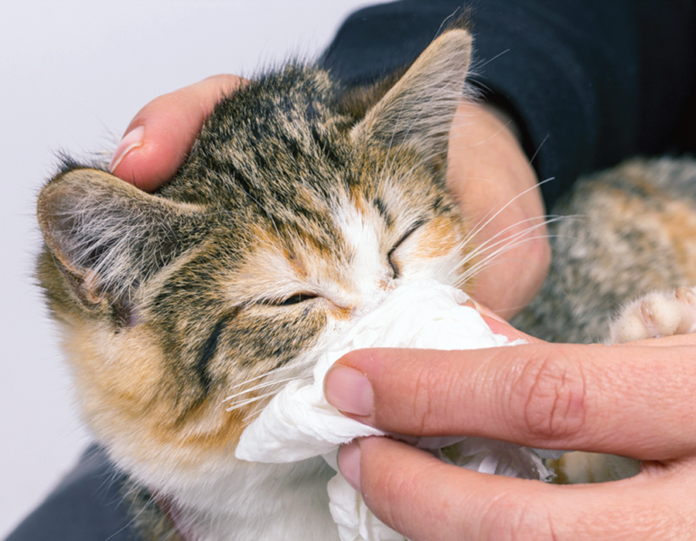While cats may lose vision and hearing with age, their sense of smell usually remains intact throughout life. Cats use their sense of smell to find food, identify friends and foes, and to find their way home. It’s an important sense for their wellbeing, and sometimes they need a little help when things go wrong.
Cats can develop temporary or permanent loss of smell from respiratory infections and permanent loss from trauma or cancer of the nasal structures. Cats with a permanent loss do adjust over time, but they may require some help to get them back on track.
For the more common temporary loss of smell from a respiratory infection, you can help your cat. A severe respiratory infection often results in a heavy, yellowish nasal discharge. This thick discharge prevents your cat from smelling his food—or anything else for that matter. It can be difficult to get a sick cat to eat!
Start by cleaning the nose. Use soft tissues or moisturized wipes to clean off any discharge and debris. If there are dried-on crusts, use a warm compress—like a warm, wet washcloth—and gently compress the nose briefly first to loosen up the hardened material, then wipe it away. If your cat is a tolerant kitty, you can try to gently suction some debris from her nose with an eye dropper.
Consider a vaporizer. Many cats benefit from spending some time in a steamed-up bathroom or in a room with a baby vaporizer. The warm, moist air will loosen secretions and help with crusts on the nose. Always watch your cat’s breathing, as the increased humidity may be too much for some very ill cats.
Avoid unnecessary odors in your household, which can overwhelm and irrirate nasal pathways in cats (and sensitive people). You’ll see your cat sneeze, squint up her face, or simply leave the room, sometimes very quickly.
Consider things like smelly household cleaners and scented sprays, oils, potpourri, and candles. Even some laundry detergents can be irritating.
If you must use these items, keep your cat away from the odors. Shut her in a room you’re not cleaning, for example, or remove her from the living room if scented candles are being used.
Scared or Angry?
Signs of Aggression
- arched back with hair standing up
- ears flattened back or tensely pointed forward
- hissing or growling
- staring directly at you
- stiff body posture
- tail thrashing, twitching rapidly, or tightly tucked under her body
- whiskers out wide/pointed forward
Signs of Fear
- crouching
- ears flattened sideways or back
- eyes wide open but not staring
- hissing or growling
- head tucked in
- standing sideways
- tail curved in toward body
- whiskers flattened
What You Can Do
Getting a cat to eat when she doesn’t want to can be frustrating. Getting a sick cat to eat when she doesn’t want to can be even worse. Odorous foods are the way to go:
- Smelly fish: It’s a major kitty favorite.
- Use human tuna (mix the juice into her dry food).
- Add tuna juice to water, but always include a bowl of plain water, too.
- Warm stuff up. Warming foods slightly can increase their scent, but be careful not to heat foods to the point that they can burn your kitty’s mouth. Feel the food yourself to see how warm it is before you actually feed it.
You want those odors to penetrate any internal debris and travel to the olfactory portion of the brain where scents are processed.




